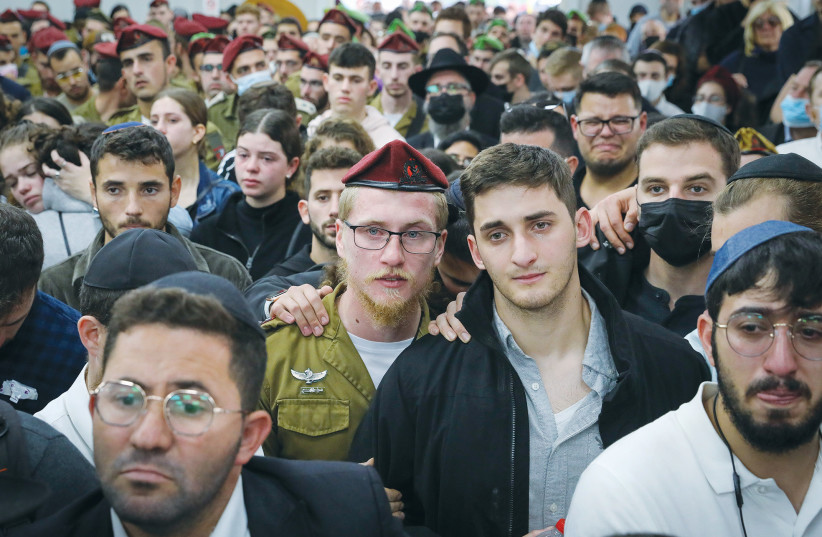Eliyahu David Kay is a hero of the Jewish people. He was murdered in Jerusalem this week for one reason only: being a Jew. He was a proud Jew and a committed Zionist. A lone soldier, Eli came to Israel on his own, served in the IDF, and then began to make his life in Israel. His brothers, too, have served as lone soldiers.
Eli was born to parents and grandparents who live these ideals deeply, and who instilled them in their children. The Kay family have for generations been pillars of the South African Jewish community, and together with the Levin family in London, are exemplars of kindness, contribution and faith.
And Eli grew up in a community in which the flame of Zionism burns brightly – South African Jews have always volunteered in droves to defend Israel on the battlefield, have made aliyah in our thousands, and been on the frontlines in the battle against BDS, standing up fearlessly to our own government.
This is the rich soil in which Eli Kay was born. Through the life he lived, he reminded us all of the original Zionist ideals and the incredible self-sacrifice of the early pioneers, many of whom gave their lives protecting and preserving the dream of a Jewish state.
Where does such idealism originate? It did not begin in Basel in 1897, but thousands of years before, at the very onset of Jewish history. In the famous opening words of Parashat Lech Lecha, God tells Abraham, the founder of the Jewish people: “Go – from your country, from your birthplace, from your father’s home – to the land I will show you.”

Abraham was called on to leave the comfort and familiarity of the home he grew up in; to leave everything behind and journey to the Land of Israel to fulfill his God-given role in Jewish history and Jewish destiny. Zionism begins right there, rooted in this original call from God; in our sense of mission and our very identity as a nation.
Eli Kay lived this Zionism – a Zionism rooted in the divine ideals of our people, a Zionism that transcends mere Jewish nationalism, and speaks to something far deeper; the same idealism, the same noble-minded Zionism, of the founding father and mother of the Jewish people, Abraham and Sarah.
And it’s the golden thread that runs throughout Jewish history; that connects one family of brave, selfless heroes to another. We are about to celebrate Hanukkah, when we remember how Matityahu and his brothers, known as the Maccabees, – a family of Torah scholars, from a tribe of priests – single-handedly defeated the mighty Greek empire, reclaiming the land of Israel.
But this was more than a military victory. The Temple in Jerusalem had been overrun by the Greek army and converted into a shrine for idol worship. And the Greeks had imposed not just political dominion over the Jewish people but cultural and ideological hegemony too. In seeking to impose Hellenistic values and philosophy, and supplant Torah values and a Jewish way of life, the Greeks outlawed the performance of many crucial mitzvot, including Shabbat and circumcision – an attempt to subvert the entire Jewish value system.
Unlike the Romans who came after the Greeks, and who actually burnt the Temple to the ground, the Greeks were more intent on redirecting the Temple towards their own ideology and beliefs. They brought idols into its sacred precinct and used the Temple and its facilities for their pagan worship.
They tried to inflict not just political dominion over the Jewish people but cultural and ideological hegemony too. In seeking to impose Hellenistic values and philosophy, and supplant Torah values and a Jewish way of life, the Greeks outlawed the performance of many crucial mitzvot, including Shabbat and circumcision – an attempt to subvert the entire Jewish value system.
This was not a fight for physical survival, or a simple conflict over territory and resources. The Maccabees weren’t just political freedom fighters. Theirs was a struggle for Jewish values and ideals.
That is why our sages focused on the menorah and the miracle of the oil as the symbol of Hanukkah, rather than the miraculous military battle. The menorah – the rededication of the Temple to its holy service, the spiritual values and practices of the Jewish people, the light of Torah – is what the Maccabees were fighting for.
It is deeply significant that the modern State of Israel chose the menorah as its official symbol. It reminds us that to be a Jew, and to be a Zionist, is not a simple nationalistic identity; that our connection to the Land of Israel and to our people is rooted in our values and in our Torah.
The senseless murder of Eli Kay makes this clear – the cold-blooded gunning down of a tour guide doesn’t fit into a political or nationalistic narrative. Our struggle with those who would banish us from our land is not, in essence, a territorial battle but one of values. If this were a mere political dispute over nationalism and borders, the conflict would have been resolved long ago.
Eli was murdered in the Old City of Jerusalem, on the way to pray at the Kotel, meters away from the very place the Maccabees entered the Temple; and with their same heroic spirit and with their same clarity of vision and values, Eli sacrificed his life for the same cause.
May the memory of Eliyahu David ben Avraham Chaim be a blessing.
The writer is chief rabbi of South Africa.
